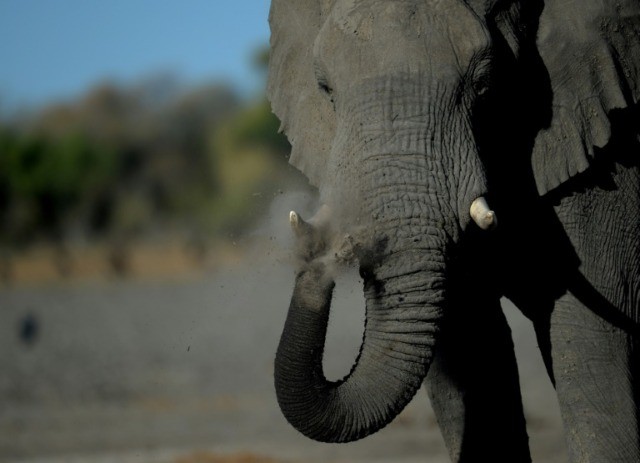Gaborone (Botswana) (AFP) – Botswana, home to the world’s largest elephant population, on Friday held its first major auction for trophy elephant hunting quotas since scrapping a hunting ban last year.
The one-hour sale was conducted by a local firm Auction It from the premises of the Ministry of Environment, Nature Conservation and Tourism in the capital Gaborone.
President Mokgweetsi Masisi raised the ire of conservationists in May when he revoked a moratorium, just a year after he succeeded Ian Khama, an avid environmentalist, who introduced a blanket ban in 2014 to reverse a decline in the population of wild animals.
Masisi fended off criticism of his government’s decision, saying the move would not threaten the elephant population.
Seven hunting licences of 10 elephants each were on offer, and six were sold at the auction, according to an industry source. Prices ranged from 3.6 million to 4.7 million pula ($330,000 – $430,900).
Government said hunting would be “controlled” and confined to areas most impacted by “human wildlife conflict,” a reference to elephants roaming off game parks into communities.
The 2020 hunting season is expected to start in April.
According to an auction advisory, bidders had to have “demonstrable appropriate elephant hunting experience” and have no previous wildlife criminal convictions.
Hunting of collared elephants will be prohibited.
All elephant hunting expeditions will have to be accompanied by a guide and a professional, at all times, according to the auction notice.
Masisi’s decision to lift the hunting ban last year was highly praised by local communities but derided by conservationists and ignited tension between Khama and Masisi.
The auction was barely mentioned in local papers, despite high interest among international news outlets.
– Overpopulation –
Masisi has defended his decision to end the hunting ban saying Botswana has an overpopulation of elephants, and pledged to regulate the practice.
His predecessor Khama was bitter.
“I have been against hunting because it represents a mentality (of) those who support it, to exploit nature for self interest that has brought about the extinction of many species worldwide,” he told AFP in a phone interview.
He said allowing commercial hunting could “demotivate those who are engaged in anti poaching, who are being told to save elephants from poachers but the regime is poaching the same elephant and calling it hunting”.
Audrey Delsink, Africa’s wildlife director for the global conservation lobby charity Humane Society International said “the Botswanan elephant hunting auctions are deeply concerning and questionable”.
“Hunting is not an effective long-term human-elephant mitigation tool or population control method,” she said from neighbouring South Africa.
Neil Fitt, who heads Kalahari Conservation Society in Botswana, said hunting was a new source of revenue for the country, but cautioned it had to be practised “ethically and properly”.
With unfenced parks and wide-open spaces, Botswana has the world’s largest elephant population with more than 135,000 animals — about a third of the African continent’s total.
Most of the animals are in the northen Chobe National Park, an important tourist draw.
But elephants invade villages located near wildlife reserves, knocking down fences, destroying crops, and at times killing people.
“Elephants are a menace in our area,” said Tshepang Mogogoma, who lives in the central village of Nata.
“I don’t know about the elephants auction taking place in Gaborone but I think they must sell as many elephants for hunting as possible.”

COMMENTS
Please let us know if you're having issues with commenting.